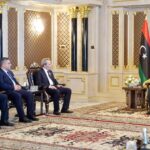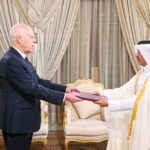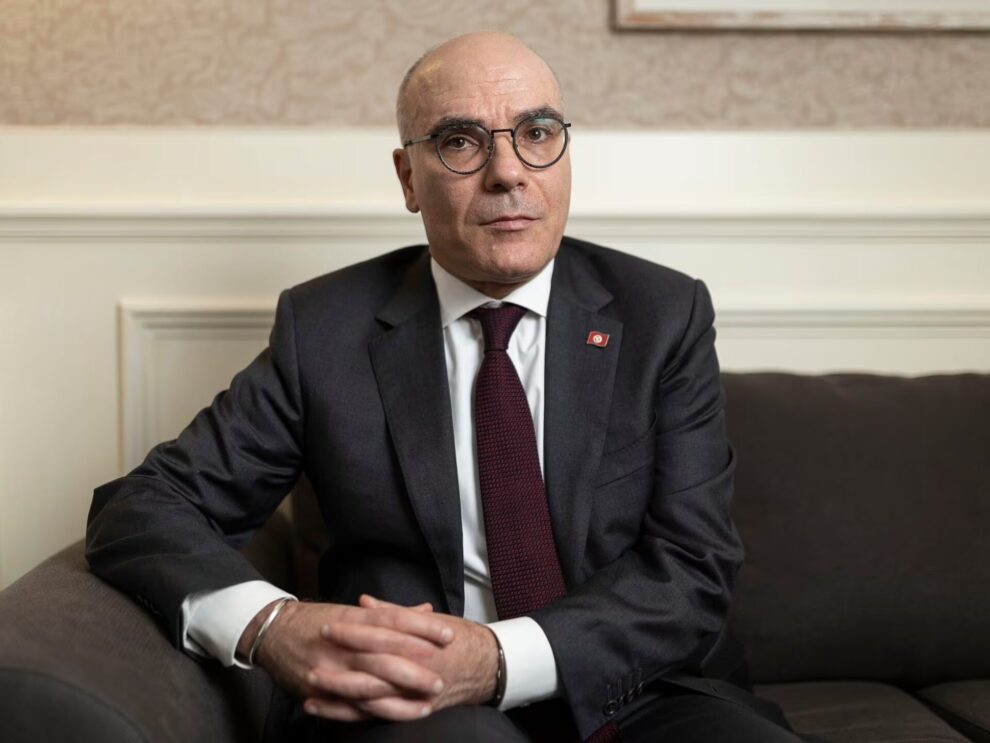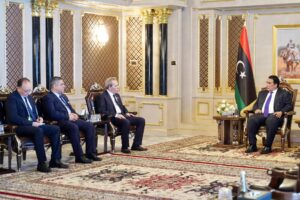On Monday, the Majestic Hotel in Barcelona was bustling with ministers who participated in the 8th Regional Forum of the Union for the Mediterranean (UfM), whose only point of debate was the situation in Gaza. One of the officials at the event was Nabil Ammar, 58, head of Foreign Affairs and Migration of Tunisia in the administration of Kais Saied.
There has been growing criticism of the authoritarian drift attributed to Saied after the dissolution of Parliament in 2021 and the new Constitution that was approved the following year, which put an end to the Arab Spring movement that began precisely in this country. Tunisia is also in the spotlight as a key country for migration control: in July, the European Commission established a memorandum of understanding with the government of Tunisia that, among other things, provides for the provision of funds in exchange for the control of migratory flows. The agreement, which the EU executive wants to use as a model for future pacts with other countries, caused some discomfort in a few EU member states due to the lack of prior consultation and the collaboration with a government that is accused of violating human rights.
Question. What conclusions did you draw from the Mediterranean forum meeting?
Answer. It is the beginning of an awareness that what is happening in Gaza and in the West Bank is completely unacceptable, dangerous, and opens the door to all possible scenarios. It is unheard of.
Q. Do you fear that Hamas will gain popularity in the Palestinian cause?
A. The consequences of this degree of suffering carry serious risks for stability in the region and beyond. It creates thousands of people with a terrible resentment, it leaves people traumatized, unbalanced, and it is fuel for all kinds of desperate and violent acts of revenge. But it is up to the Palestinians to decide who represents them. The problem is colonization, which did not begin on October 7. Gaza has been an open-air prison for years. Humiliations in the West Bank are a daily occurrence. And when Palestinians rebel, then they are said to be terrorists. There is also talk of moving the population to Egypt or Jordan. This is a red line.
Q. On migration policy, the memorandum of understanding between the European Commission and Tunisia sparked much criticism. Do you understand why?
A. We have no trouble with the EU. On July 16, we signed a memorandum based on mutual respect in five pillars, not only on migration. But problems arose within the EU. It’s not our problem.
Q. Last September, Tunisia refused to receive a delegation of the European Commission and another of members of the European Parliament. Why was that?
A. It’s very simple. I know them [the MEPs] from when I was ambassador in Brussels. They have a personal problem with [the government of] Tunisia because they have relations with parties that are in the opposition. The attitude was unacceptable. They were coming on an inspection mission. We will no longer accept this, it was an act of provocation.
Q. Concerns have also been raised by NGOs that denounce expulsions of sub-Saharan migrants. This summer dozens died in the desert, on the border with Libya.
A. There is no expulsion policy. Each country protects its borders. We do not build walls or shoot those who try to pass. There is a very humane treatment, but at the same time we are obliged, and it is our right, to control our borders. This situation has been exploited by NGOs, which have a political agenda. They put pressure on us to accept illegal migrants. But we are not a country of transit or destination. And we are not the EU police. Any solution exceeds the capabilities of a single country. The political situation south of the Sahara, the economic situation, Covid, the war in Ukraine, climate change… It is not our responsibility to pay the bill. And NGOs should talk less and put more resources in, or we won’t cooperate like before.
Q. Is there an authoritarian drift in Tunisia, as NGOs are reporting?
A. There may be, as in all countries, people who take advantage of this atmosphere and go too far. But the police step in. There is no state policy to mistreat or refuse to help illegal migrants, who are victims of trafficking groups. To criticize us, they say that we have become authoritarian, that we have changed, but that is not the case.
Q. So nothing changed in 2021, when Tunisia became governed by decree?
A. No, now there is a parliament. We governed by decree in a transitional situation in which parliament was not operational.
Q. Are you asking for more compensation for controlling migration?
A. It’s not a question of money. The funding we receive is almost nothing, but what is needed is a global policy. The best solution is to create wealth in countries, to invest in them. To integrate the southern shore of the Mediterranean, as the EU has done among its countries. This way, people will not risk their lives by going by boat to Europe.
Q. Is it necessary to share democratic values to build a future for the southern shore?
A. There is a lot of potential, but democracies do not arrive all at once. What was Spain like 60 years ago? The oldest democracies are, what, 250 years old? They have had a process, and an accumulation of wealth that has allowed them to be democracies. Our European partners, friends and neighbors have to understand that they do not have a monopoly on the truth, they are a minority on the planet, and their models can also be criticized. Each country finds its own balance.
Q. Is this the case in Tunisia?
A. We are reorganizing ourselves after 11 terrible years. We no longer want false democracies piloted by foreigners or money. We want an internal balance and an authentically Tunisian democracy, without intervention from the outside or foreign NGOs. Tunisia has a very interesting economic potential: trade, tourism, green energy and things like olive oil, which we are being prevented from exporting to Europe. Instead of all these opportunities, they only look at whether you are democratic or not. Because they want a different Tunisia, one that is weak and doing whatever is asked of it. This is over.
Q. When was it over?
A. On July 25 [2022, when the new Constitution was approved] we said ‘it’s over.’ But above all, it’s over after what started happening in Gaza. The great collateral damage of this war is that it has left the legal system and universal international values in tatters. Today, no one believes in them. They look at what happens there and ask themselves, what principles are they talking about, what democracy? It is a great loss for the West.
Q. What is the solution?
A. Stop the war and make reparations, although it will be very difficult. Give them their rights, their lands. And stop this narrative that they are terrorists who want to kill Jews. It has nothing to do with being Jewish or Muslim. We must stop investing in war and stop seeing the southern shore as potential enemies. You Westerners have built yourselves up on blood and weapons, you have colonized, you have accumulated wealth, and this has left you with a good cushion to fall back on. And when you got rich, you said, “come on, let’s make a little democracy.” We must be aware and work together on a solution. I welcome the position of the government of Spain on this issue, we must go down this path. Not because of the law of the fittest, of international resolutions that are not fulfilled. October 7 is proof that everything that has been done since 1948 is a total failure.
Source: EL Pais
















